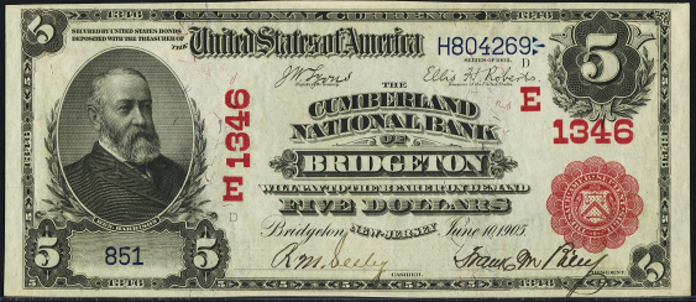Five Dollar Notes › Nationals › 1902 Five Dollar National Bank Notes › Massachusetts Charters › 1902 $5 Quincy Massachusetts National Granite Bank
Get Value Now
| Item | Info |
|---|---|
| Series | 1902 |
| Charter | #832 National Granite Bank of Quincy, Massachusetts |
| Year Chartered | 1865, 944 Banks Chartered |
| City Info | Quincy is the largest city in Norfolk County, Massachusetts, United States. It is a major part of Metropolitan Boston and is Boston's immediate southern suburb. Its population in 2014 was 93,397, making it the 8th largest city in the state. Known as the "City of Presidents," Quincy is the birthplace of two U.S. presidents — John Adams and his son John Quincy Adams — as well as John Hancock, a President of the Continental Congress and the first signer of the Declaration of Independence. Source: Wikipedia |
| Similar Cities | If your note doesn't match try: 1. Quincy, Massachusetts - National Mount Bank 2. Quincy, Illinois - Merchants and Farmers' National Bank 3. Quincy, Illinois - Ricker National Bank 4. Quincy, Michigan - First National Bank 5. Quincy, Illinois - Quincy National Bank 6. Quincy, Florida - First National Bank 7. Quincy, Washington - First National Bank |
| Seal Varieties | Red, Blue |
| See Also | If your note doesn't match try: 1. 1907 $5 Legal Tender 2. 1899 $5 Silver Certificates |
| Other Info | 1. Value depends on notes known for charter, condition and market demand. |
| Neat Fact | Date Backs issued in sheets of 4 $5 notes (Friedbergs, 20th Ed. P127) |
No Obligations Offers and Appraisals
Please submit a good photo or scan. It will be identified and evaluated. Understand there may be subtle differences between the image you see above and your note. Signatures, design, markings and note condition will determine the offer price. Notes in Uncirculated or better condition receive the best offers.
Appraisals can be estimated for wholesale and retail prices. Wholesale is what dealers typically pay. Retail is what a collector might pay. Retail is slightly higher in most cases.
Please visit this page for USA Paper Money Reference. Do not treat this page as a reference guide, it is for appraisal and acquisition purposes only.
